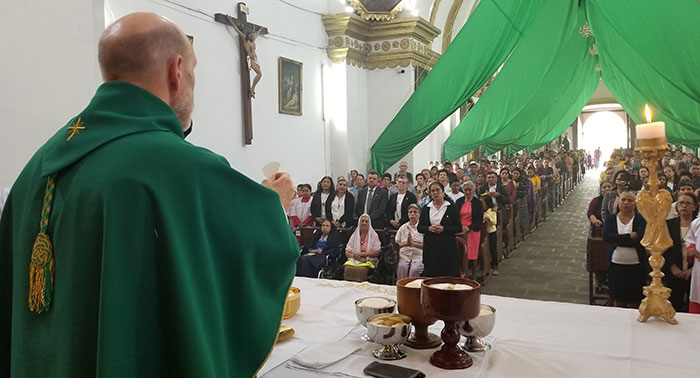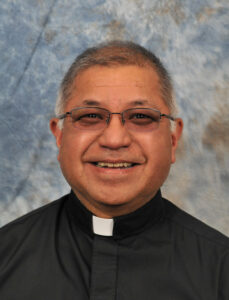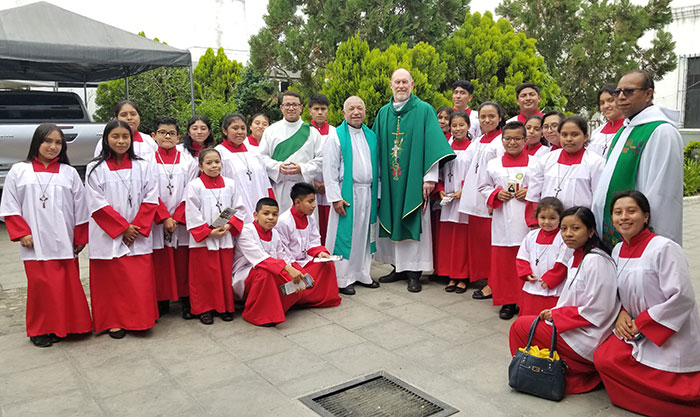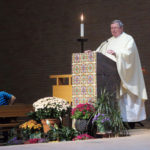
Archbishop-elect Thomas Zinkula celebrates Mass at St. Raymundo Church in Guatemala last month.
By Barb Arland-Fye
The Catholic Messenger
Archbishop-elect Thomas Zinkula and Father Rudolph Juarez recently traveled to Guatemala to meet three religious sisters who will serve in the Diocese of Davenport and to get to know their

religious community, its mission and ministry in Latin America. It is a gift of ministry made possible through the U.S.-Latin American Sisters Exchange Program, a partnership between Catholic Extension and the Conrad N. Hilton Foundation.
The sisters will make their home in the unoccupied rectory of St. Joseph Parish in Columbus Junction and serve that faith community and St. Joseph Parish in West Liberty for the next five years. Both parishes and towns have majority Hispanic populations.
Catholic Extension chose the Davenport Diocese for the exchange program based on its desire to serve a growing Hispanic population. Diocesan leaders “wanted to bring sisters who could connect with and touch the hearts of those who are most in need in the community,” said Erika Cedrone, vice president of Mission for Catholic Extension. The fundraising organization, which helps ensure that all American Catholics can practice their faith within vibrant faith communities, endeavored to match a religious community with the diocese’s needs.
Funding for the exchange program included the trip Aug. 24-28 to Guatemala by Archbishop-elect Zinkula. Father Juarez, the diocese’s vicar for Spanish-speaking people and pastor of St. Anthony Parish in Davenport, accompanied him. “We ask that the bishop travel to the diocese to meet the provincial or the superior general to get to know them,” Cedrone said. The religious community leader “needs to feel confident that she is sending the sisters to a good place.”
Lives of service
Archbishop-elect Zinkula and Father Juarez stayed at the province house of the sisters’ religious community, Misioneras Cruzadas de la Iglesia, where they met Sister Marta Ludmila Garcia Locon, the provincial. They also visited the community’s sisters selected for the exchange program — Sister Maria de los Angeles Gumara Mejia Chacon of Mexico, and Sister Maria de los Angeles Martinez Quineros and Sister Veronica Elizabeth Argumedo Mungia of El Salvador.
The sisters are living and serving together in St. Raymundo Parish and town in Guatemala to prepare for their ministry in the Davenport Diocese, which begins next month.
“We got to know the sisters within the context of their community. It gave us a better sense of who they are and what they are all about,” the archbishop-elect said. “The encounter was a joyful experience, a hopeful experience,” said Father Juarez, “especially to see the sisters living a simple life of service — with joy.”
Across the street from the province house, the religious community operates a boarding residence for young girls in grade school through high school. While visiting the residence, Archbishop-elect Zinkula and Father Juarez witnessed the reunion between a former resident and the sisters who had become her family.
A visit to St. Sebastian Parish was also on the itinerary. This is where the martyred Auxiliary Bishop Juan Jose Gerardi Conedera served before his assassination in the rectory’s small garage in 1998 — two days after presenting a report documenting the atrocities committed during the searing 36-year civil war in Guatemala.
The bishop’s solemn face is among the faces of many martyrs of Central America — clergy, religious sisters and lay people and children — portrayed in a mural that covers an entire wall in the parish garage. Archbishop-elect Zinkula and Father Juarez said the mural touched them deeply. These were people whose faith transcended the oppression and poverty they endured. The poverty, along with political crisis, continues to challenge the people today in Guatemala, Archbishop-elect Zinkula said.

Father Rudolph Juarez and Archbishop-elect Thomas Zinkula stand with many altar servers outside St. Raymundo Parish in St. Raymundo, Guatemala.
Faith-filled people
He and Father Juarez met with Archbishop Gonzalo de Villa y Vasquez, SJ, of the Archdiocese of Guatemala and visited the Holy Church Cathedral Metropolitan Basilica of Santiago de Guatemala and the parishes of St. Pedrito and St. Anthony. They celebrated the vigil Mass on Saturday night at St. Pedrito and Sunday Mass at St. Raymundo.
The Davenport visitors witnessed Guatemala’s poverty firsthand as they walked through neighborhoods of homes constructed of flimsy materials such as tin, cinder block and discarded wood built atop a former dump on the outskirts of Guatemala City. Jesuit priests and lay catechists serve the people of St. Anthony Parish and the neighborhoods, through which Archbishop-elect Zinkula and Father Juarez took a walking tour accompanied by catechists. “They were telling us about the poverty,” Archbishop-elect Zinkula said. “The drugs, gangs, human trafficking,” Father Juarez said. They encountered a mother whose son had just died in a motorcycle accident, leaving behind two children and one on the way. “She was saddened but yet very hopeful because of her faith,” Father Juarez said.
Their walking companions told them why people come to the U.S. seeking a better life and send back money that people desperately need. However, the exodus drains the community of its young people and breaks up families, Auxiliary Bishop Tulio Omar Perez Rivera told them.
Father Juarez joked about the royal treatment Archbishop-elect Zinkula received everywhere they visited. At St. Raymundo, 400 to 500 Catholics filled the church, clapping and singing. A couple of dozen altar servers stood outside to greet the archbishop-elect and Father Juarez as they passed from the parking lot into the parish compound. “I’m just a simple bishop from this little diocese in Iowa,” Archbishop-elect Zinkula said, recalling his surprise at the pomp and circumstance.
He was caught off guard when he learned he would be presiding at the Mass. He doesn’t speak Spanish and didn’t want to wing it. However, quick thinking and a helpful app provided a huge assist. “I was basically celebrating the Mass on my phone, with Fr. Rudy translating here and there when appropriate” he said.
Sister Marta, the provincial, was present as were the three religious sisters she chose to spend the next five years ministering in the Davenport Diocese. After Mass, the gathering celebrated the installation of a picture of the congregation’s founder, St. Nazaria Ignacia March Mesa, which Archbishop-elect Zinkula blessed. St. Nazaria, who founded the religious community in 1925 in Spain and served as a model of holiness and simplicity, was canonized in 2018.
Bridge builders
The sisters who are coming to Iowa described their work at St. Raymundo, going house to house in the countryside to talk with people and provide pastoral ministry. “The people shared their hardships with them and the sisters said it was a meaningful experience for them. They’re a good group,” Archbishop-elect Zinkula said. “I fully expect that the same, simple encounter of the sisters sharing in the lives of the people will continue here,” Father Juarez said.
St. Raymundo Parish was a highlight for Father Juarez. “The people were so friendly and their reception and welcome for the Archbishop-elect was superb. I also was very moved by the story of Bishop Gerardi, the wonderful work of the sisters with young ladies and the Jesuit priests who live and work with the most marginalized people in the capital.”
A highlight for Archbishop-elect Zinkula was the vibrancy of the Church in Guatemala. “Life is so hard, but the ministry to the people that we witnessed — walking with them, helping them to know God — makes me feel good about the Church there.” That ministry will translate well in the Davenport Diocese, he believes.
While ministering here, the sisters will receive education and training through several university partners and have the opportunity to earn a bachelor’s or master’s degree through St. Mary’s University of Minnesota, Cedrone said. As they build on their advocacy and leadership skills, they in turn work to build those skills in the Hispanic populations they serve, she added. “These sisters are bridge builders, ‘gente puentes,’ between the Hispanic communities and identifying leaders who may not in the past have stepped to the forefront.”











